Kate Frood is headteacher of the Eleanor Palmer primary school in Camden, London. She was recently awarded an OBE for more than 30 years' service in education.
Although a journey from the head's office to the playground at Eleanor Palmer primary seems maze-like – leading through at least 10 dozen displays under the children's arty creations that dangle from the ceiling – the school is tiny. And as a one-form entry school that never accepts a class of more than 30, it is increasingly rare.
When Kate Frood became headteacher at 12 years ago, she decided the small, community nature of the school was something that she wanted to protect. Having worked as a teacher since 1983 – each position at a school in Camden apart from a brief spate as an adviser at Camden council – her training gave her a grounding in the ideas of child-centred learning.
This was before the days of data, a national curriculum, or even computers. "I ran a school without a computer," Frood recalls. "In my first headship there was no email, and the school still worked. I can't recall what I did all day, but I was very busy, probably handwriting letters."
For Frood, knowing her kids is essential. She spends 90% of the day speaking with teachers, students, parents. "It's all about being accessible, which means plenty of 'quick words' and 'do you have five minutes?', rather than 2pm meetings with Miss Frood booked in for Friday afternoon."
Recognising every child, and having the time to speak to them, is obviously much easier if there are fewer individual needs to meet. "I see these primaries opening up eight-form entry and I worry. This whole economies of scale thing – I think it is a mistake."
"We have – not many, but occasionally some – very complex kids and they always succeed here. It's because they are understood, included and loved... And then off they go to secondary school: spin that dice. They only need a history teacher to be nasty to them without realising that, if you shout at Matthew, it can all go wrong.
"If you're a vulnerable, insecure, young person – who has no emotional resilience and you're suddenly one of 240 in year 7, that's tough."
Frood is quick to acknowledge that she's in a fortunate position. The school isn't just smaller than the average, it's also extremely popular among the north London middle classes, which is a mixed blessing. Today, some 20% of students are on free school meals, compared with 30% when Frood took over the school 12 years ago. It's "annoying", she says, that middle class families try to colonise the school catchment area – it was recently at the centre of an admissions fraud row – but the diverse student population is an advantage.
Middle class parents who apply to the school generally believe in a comprehensive, inclusive and broad education and they're often left-wing or liberal. "It's not some part of Kent where you get your child into a grammar school or kill yourself," Frood puts it bluntly.
And children from such backgrounds provide: "a critical mass of high-achieving, gorgeous, motivated, liberal, middle-class kids – so all my working class or refugee kids get caught up."
Schools in central London have a wealth of galleries, museums, successful companies, regular buses at their fingertips, she adds. And if you are in a school that is below floor targets, these are the exact things that you are tempted to scrimp on: "you feel you have to focus on the core curriculum."
But excluding the arts or extra-curricular activities isn't the answer: "If I trained for a marathon, I would probably succeed. If I didn't run for three months, I then wouldn't be able to run a marathon. Some of those kids are just coached and coached so they get their level fours – they don't get anything else from school. Then they go to secondary school when they're not actually level fours and, more importantly, they hate school because of their experience."
Although teachers today are better than they've ever been, says Frood, they are a generation trained to teach surrounded by data, systems and targets. "I learned to teach children without all these constraints around me, of league tables, tests and so on."
"What's special about my generation of heads is that we were class teachers the 1980s, when it was about child-centred learning. I don't mean all play, play, play and painting; I mean we learned our trade when what mattered was the child. This was before the national curriculum came in 1989, then testing."
After 19 years in headship, Frood describes herself as "a frustrated classroom teacher". Her shelves are packed with endless ideas about how to teach maths, and there are around 2,000 dice floating around the school, also used in her weekly maths lessons. It's a way to keep your hand in as a head and to share ideas, she says. "It's like in the NHS, if you suddenly become some horrible middle-ranking-something-or-other, you should go and do a bed bath everyday. Partly so you're credible, but also so that you remember what it's like to be with that child who is really difficult."
And, by inviting other staff members to stay and watch, it's also a chance to share ideas. As a teaching school – Frood's newest project – Eleanor Palmer takes professional development seriously. Most of its professional development take place in the classroom, Frood says: "Paying £350 to watch some consultant in a church hall talk about getting level fives isn't much use. It's always more fun to watch teaching in action. People love seeing an actual lesson, where they can watch a child strop or a whiteboard not working."
Would she ever take over a failing school? "This is the thing that the government needs to tackle. Where is the motivation to take on a school that's below floor targets?"
"There are so many entrenched cultural issues. It must be difficult to be resilient and confident. I would go and take over a school like that if I had Lloyd's of London to sponsor me and give me £1m to transform the building, attract amazing staff, have three artists in residence, pay for every group to do a residential. But the government doesn't get that it's about money."
One thing is for sure: "I vowed to myself that I will never be one of those flyers," Frood gestures towards a recycling bin that has been filled with adverts from education consultants.
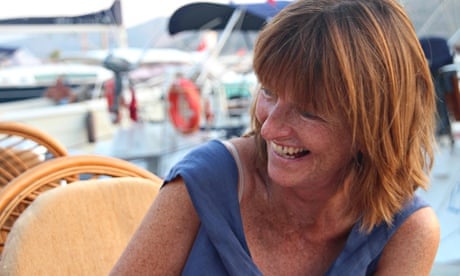

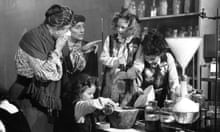

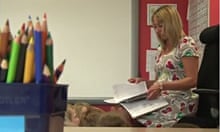



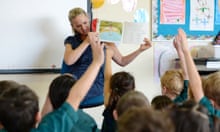

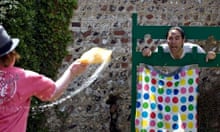
Comments (…)
Sign in or create your Guardian account to join the discussion